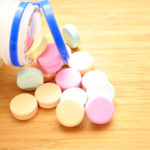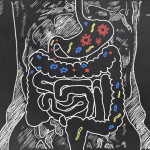By Bonnie Jenkins
For years, scientists have been telling us that drinking red wine can help prevent heart disease. But now there’s evidence that a certain compound in red wine—resveratrol—can help our brains too. A new study in the latest issue of the American Journal of Clinical Nutrition reports that taking supplemental resveratrol quickly enhances blood flow to the brain. And better blood flow means better brain function.
During the double-blind, crossover study, which was conducted by researchers from Northumbria and Newcastle Universities in England, researchers gave volunteers either a placebo or one of two doses (250 mg. or 500 mg.) of resveratrol. Forty-five minutes later, the blood flow and cognitive performance of the participants was measured.
Each of the subjects was asked to complete a selection of cognitive tasks designed to activate the brain’s prefrontal cortex. The prefrontal cortex is responsible for executive functions, which include planning, making choices between right and wrong or good and bad, predicting future events and governing your social behavior. It’s also strongly associated with general intelligence.
While the volunteers completed the tasks, blood flow in the brain was measured using near-infrared spectroscopy. While there weren’t any changes in the placebo group, both of the resveratrol groups showed increases in cerebral blood flow. The researchers also found that those taking the resveratrol experienced a boost in deoxyhemoglobin, a compound in the blood that indicates that oxygen is being released into the brain tissue.
The researchers think that resveratrol might trigger nitric oxide (NO), which improves blood flow by relaxing the blood vessels. NO diminishes as we age. As a result, so does cerebral blood flow. That’s one reason why so many brain-robbing ailments like Alzheimer’s disease, vascular dementia and stroke are much more common in older people.
The World's Quickest Solution for Ending Prostate and Urinary Misery
This has recently been revealed to be one of the only real breakthroughs in prostate health.
The seeds of a strange fruit (sometimes called "Chinese Apples") hold powerful phytonutrients that are a revolution in prostate health.
In fact, UCLA and Veterans Administration research have now proved this to be true.
Not only that, but it may be the worlds quickest solution for ending prostate misery.
Simply stated, these phytonutrients represent a huge step beyond beta sitosterol, saw palmetto, and other phytosterols alone.
Simply click HERE if you want to have fast prostate relief...restful, uninterrupted sleep...no more constant "urges to go"...enhanced virility...and optimal prostate support for life.
Unlike many antioxidants, resveratrol can cross the blood-brain barrier to help protect your brain and nervous system. This means that it may also protect brain cells from free radical damage. But its benefits go well beyond your brain. Resveratrol helps guard against atherosclerosis by helping to prevent blood platlets from sticking together. Preliminary research also suggests that it may prevent the formation of tumors. And promising studies hint at resveratrol’s role in longevity.
But, while this unique polyphenol is well-absorbed by the body, its beneficial effects don’t last very long. This is why it’s critical to take a resveratrol supplement every day. Most experts recommend taking 200–600 mcg. per day for general health. Why so little? At this point, scientists haven’t established an optimum safe dosage for resveratrol. There is also some concern that taking higher amounts may deplete your body’s copper stores. It you do take larger amounts of this potent antioxidant; make sure to also take a multivitamin that contains copper.
References:
de la Lastra CA. Resveratrol as an antioxidant and pro-oxidant agent: mechanisms and clinical implications. Biochemical Society Transactions. 2007;35:1156-1160.
Kennedy DO. Effects of resveratrol on cerebral blood flow variables and cognitive performance in humans: a double-blind, placebo-controlled, crossover investigation. American Journal of Clinical Nutrition. Published online ahead of print, doi:10.3945/ajcn.2009.28641.
Vanamala J. Resveratrol suppresses IGF-1 induced human colon cancer cell proliferation and elevates apoptosis via suppression of IGF-1R/Wnt and activation of p53 signaling pathways. BMC Cancer. 2010;10:238






